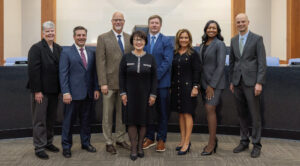Is Madison getting a science museum?
MADISON – Joe Iacuzzo and a group of other local scientists hope the answer to that question is a ‘Yes’.
Iacuzzo, the director of the Huntsville Science Festival and member of the Innovation for Education Foundation, and Ben Hoksbergen, Redstone Arsenal archaeologist, are spearheading an effort to bring a brand new science museum to Madison. They came before the city council at Monday, May 9’s work session with a proposal and request to use former Hexagon facilities that are now owned by the city as temporary housing for the museum.
The non-profit Madison Science Museum would be all-encompassing and include the scientific fields of paleontology, geology, archaeology, biology, earth science, engineering, environmental science, marine biology, and technology. Just a couple of the displays would feature real triceratops and tyrannosaurus skeletons with a 130-foot interactive, mural wall similar to one just recently created for the Smithsonian. The center would offer field trip, educational, and web-based programs for area students and play host to science conferences.
Iacuzzo’s experience with the Huntsville Science Festival convinced him that Madison is the perfect place for such an establishment.
“When I see the thousands of families at the science festival every year, I can see the thirst and the need for a science museum here,” he explained.
The city council, however, was hesitant to share Iacuzzo’s enthusiasm before asking serious questions about the plans for and future of the museum.
Council members Connie Spears, Teddy Powell, and Renae Bartlett all raised concerns about funding for the project. According to Iacuzzo, the museum needs $1.5 million to remodel and outfit the former Hexagon building for the museum’s needs, and though he has companies like Blue Origin and Amazon, and government agencies like Missile Defense Agency, interested in supporting the effort, the council worried the monetary support was not guaranteed.
Spears commented, “I think we’re a little premature in getting a building when you don’t have plans on how to support that building, and this looks wonderful. It looks amazing, but until I can see that you have actually sat down and figured out what the finances are and what the capital outlay is going to be before you can open your doors, I can’t commit on a hope and a prayer.”
Bartlett looked to the future sustainability of the museum and inquired into the amount of financial support the city of Madison may have to give the museum down the road to keep the doors open. She analyzed the city of Huntsville’s budget as an example of local precedent and found that the municipality gave over $2 million in total to EarlyWorks, Burritt, U.S. Space and Rocket Center, Weeden House, and the Huntsville Museum Art.
“I looked at how much Huntsville has to support their own museums to be able to viable [and] that the museums still charge. They still have field trips. They do all of these things, but they can’t survive just on that,” she observed.
Additionally, Council member John Seifert pointed to the potential difficulty in competing with the established and popular science museums of the U.S. Space and Rocket Center and Cooks Museum of Natural Science along with the future North Alabama Zoological Society’s facility. Iacuzzo reported that he is already working on a partnership with North Alabama Zoological Society and believes the museum can uniquely attract the highly scientific community of Madison.
After airing all of these concerns and engaging in lengthy discussion, the council decided to table the proposal and revisit it in a June work session. So, the question remains: is Madison getting a science museum?
















